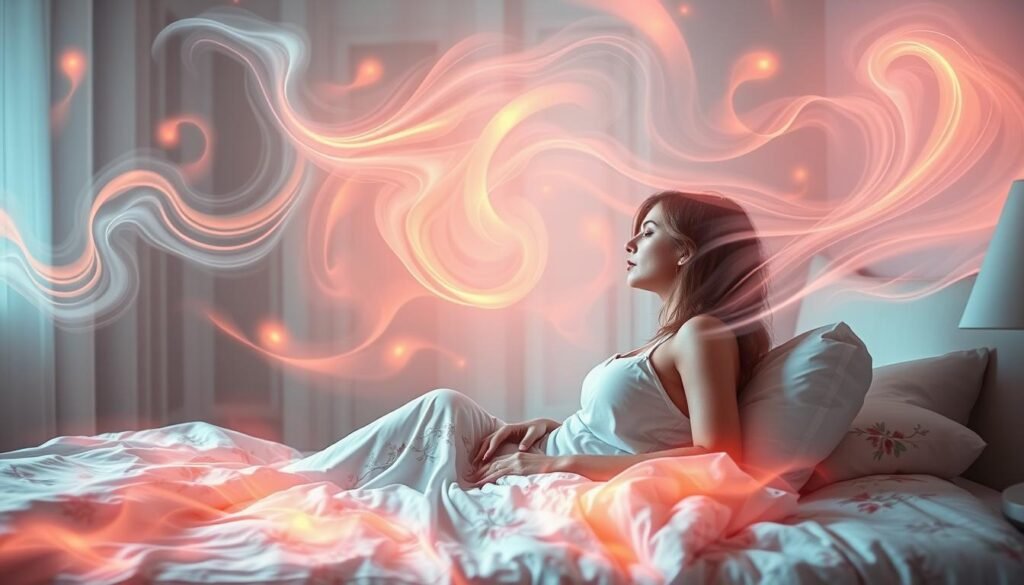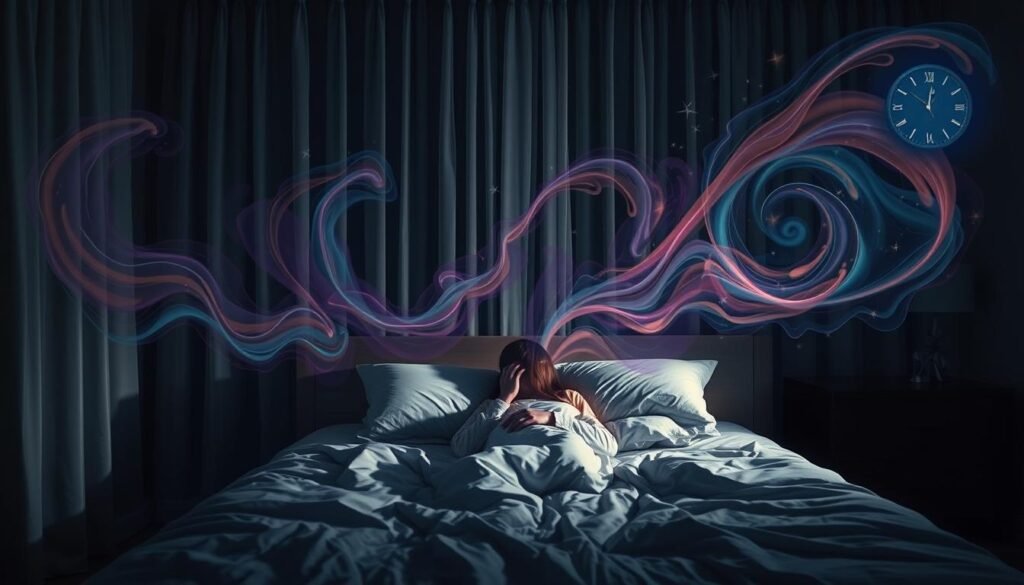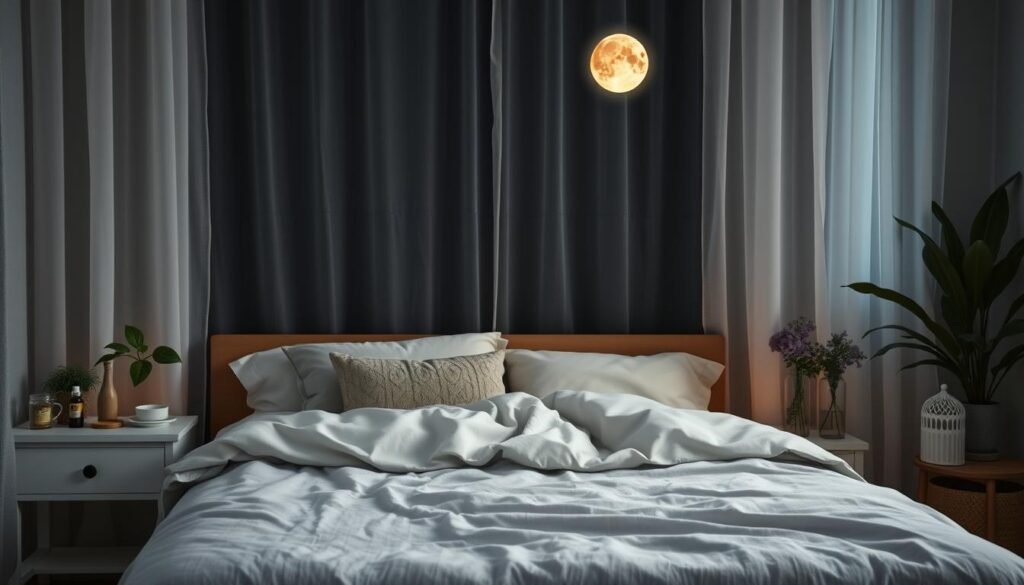Many women turn to medical cannabis for menopause. They report that it helps with sleep problems. This fact shows the complex link between hormone replacement therapy (HRT) and sleep quality. While HRT helps with hot flashes and mood swings, its impact on sleep is mixed. Understanding this can explain why insomnia and other sleep issues affect nearly half of menopausal women on HRT.
Hormone replacement therapy is key for managing menopause. But, it’s important to look at personal needs since HRT’s benefits can change. This change can affect sleep. We will see how hormonal changes not only shift the body but also affect mood and well-being. This happens during menopause, a big change in a woman’s life.
Key Takeaways
- HRT may not universally improve sleep quality for menopausal women.
- Approximately 46-48% of menopausal women experience sleep disturbances.
- Medical cannabis is increasingly used to manage sleep issues related to menopause.
- Individualized treatment approaches are essential for optimal sleep health during menopause.
- Understanding mood disorders is crucial for addressing insomnia linked to hormonal changes.
Understanding Hormone Replacement Therapy (HRT)
Hormone Replacement Therapy (HRT) helps relieve menopause symptoms, making daily life better. An HRT overview shows it replenishes declining hormones. This can include estrogen alone or with progesterone. There are different types of hormone replacement therapy. They’re designed to match individual needs and ease symptoms like hot flashes, mood changes, and sleep problems.
Many women find HRT greatly reduces menopausal symptoms. Up to 80% of women get hot flashes during menopause. HRT can lower the number and severity of these flashes. It can also help stabilize mood. Yet, it’s important to know that some HRT types might affect sleep. This shows the complex link between hormones and sleep.
Exploring treatments for menopause, some women look at alternatives like cannabis. Studies suggest cannabis may help with anxiety and sleep issues. It can mimic natural substances in our bodies that regulate mood and sleep. More information is available in this research. This highlights the importance of tailored treatment plans for menopause symptoms.
How Menopause Affects Sleep Quality
Menopause brings big changes, especially to sleep. The shift in hormones like estrogen and progesterone leads to sleep problems. About 60% of women after menopause face these sleep issues during menopause.
The shift in hormone levels messes with sleep patterns. It makes falling asleep hard and staying asleep harder. Anxiety, mood swings, and changing habits make it worse, harming menopause sleep quality.
Many women try things like supplements and yoga to deal with these issues. Half of the women facing menopause look for non-traditional ways to feel better. Cannabis is also popular, with 6% using it for menopause-related sleep problems.
Since sleep problems affect daily life, it’s key to understand and tackle their root causes. Making lifestyle changes or seeking therapy can be very helpful in dealing with sleep troubles during menopause.
Common Sleep Disorders Associated with Menopause
Many women face sleep challenges during menopause. Issues include having trouble both falling asleep and staying asleep all night. By understanding these problems, managing them becomes easier, leading to better health.
Frequent Awakenings and Early Morning Awakening
Many menopausal women report waking up often at night. Studies show that 35% to 60% of women face sleep issues during this time. This often results in waking up too early and not getting enough deep sleep.
As estrogen levels change, sleeping well becomes harder. Finding out what disrupts your sleep is key to getting better rest at night.
Night Sweats and Hot Flashes
Night sweats and hot flashes can really disturb sleep. About 75-85% of women after menopause go through these, which messes up their sleep. Waking up feeling hot and sweaty can make sleeping well hard. It can also cause worry about going to bed.
Exploring treatments like Hormone Replacement Therapy or natural options can help. Finding the right solution can improve your sleep and daily life. For tips on tackling sleep issues, see this resource.
Vasomotor Symptoms and Their Impact on Sleep
Vasomotor symptoms greatly affect many women during menopause. These include hot flashes and night sweats. They disrupt sleep by changing the body’s neurochemistry, especially in the hypothalamus.

Over 60 percent of women aged 40 to 64 feel muscle and joint discomfort during menopause. This pain worsens sleep quality, leading to tiredness. Hot flashes with night sweats make sleeping well hard. Improving these symptoms can make sleep better.
About one-third of menopausal women have tried cannabis in the last month. Among them, 65 percent used it to fix sleep problems. Studies suggest that cannabis affects the endocannabinoid system, helping manage menopausal symptoms.
| Symptom | Impact on Sleep | Common Relief Methods |
|---|---|---|
| Hot Flashes | Interrupt sleep cycles, lead to discomfort | Cannabis, lifestyle changes |
| Night Sweats | Cause awakening and difficulty returning to sleep | Cooling techniques, herbal remedies |
| Muscle/Joint Discomfort | Contributes to poor sleep quality | Therapeutic products, physical therapy |
It’s important to tackle vasomotor symptoms for better sleep during menopause. Understanding these issues helps women manage their sleep better and find the right relief.
Hormonal Changes During Menopause
Menopause brings big hormonal changes that affect our bodies, especially sleep. These changes can mainly be seen in estrogen and progesterone levels. Understanding these shifts helps us figure out why sleeping can be hard during this time.
The Role of Estrogen and Progesterone
Estrogen and progesterone are key in our body’s functions. Estrogen helps with brain chemicals and keeps our body temperature steady at night. This is crucial for good sleep. Progesterone, on the other hand, makes us feel sleepy with its calming effects. However, during menopause, the levels of these hormones change. This can impact their ability to help us sleep well.
Effects on Sleep Structure and Quality
Menopause can mess with the structure of our sleep. It can lead to waking up often and change our deep sleep cycles. This can make our overall sleep worse. Poor sleep can make us feel tired and irritable during the day. It’s tough to stop this cycle once it starts.
| Hormone | Role | Impact of Changes |
|---|---|---|
| Estrogen | Regulates neurotransmitters; maintains body temperature | Increased awakenings; poorer sleep quality |
| Progesterone | Promotes sleep; has sedative effects | Reduced sleepiness; difficulty in falling asleep |
Role of Mood Disorders in Sleep Disturbances
Mood disorders, especially during menopause, greatly affect how well we sleep. People often feel more anxious and depressed as their hormones change. This can lead to insomnia, which makes anxiety and depression worse.
There’s clear evidence that mood disorders and menopause are linked to sleep problems. Insomnia is common in those dealing with anxiety or depression. In fact, 70% of individuals with major depressive disorder struggle with sleep issues. This highlights the importance of addressing mental health during menopause.
- 39% of patients reduced or discontinued sleep medication after treatment.
- 71% reported subjective improvements in sleep-related conditions.
- 18 patients had anxiety/stress disorders, the most reported condition.
- 12 patients were diagnosed with depression.

Handling mood disorders effectively is key to better sleep for women going through menopause. Treatments may include therapy, medication, or lifestyle changes. Recognizing how menopausal mental health affects sleep is vital for creating effective care plans. This improves overall health.
| Conditions | Reported Cases |
|---|---|
| Anxiety/Stress Disorders | 18 |
| Chronic Pain | 15 |
| Depression | 12 |
| Sleep Disorders | 11 |
| Migraines | 7 |
| PTSD | 6 |
| Cancer | 4 |
Tackling both sleep issues and mood disorders during menopause can lead to better sleep and a happier life. Focusing on menopausal mental health is crucial for ending this disruptive cycle.
Exploring the Connection Between Anxiety and Insomnia
The anxiety insomnia relationship is a big concern, especially for women dealing with menopause anxiety. As anxiety increases, so do problems with sleep, creating a tough cycle to break. Insomnia becomes more common as worries make it hard to sleep, showing how connected these issues are.
Sleepless nights make stress worse, adding to anxiety. This is true during menopause, when changes in hormones can make you feel more stressed. A good treatment plan needs to tackle both anxiety and sleep problems together.
Therapy like cognitive-behavioral therapy can change negative thinking and lessen anxiety. Medicine may also help break this harmful cycle. Mixing ways to handle anxiety with sleep help can lead to a better life. For more information, check out this study on how therapeutic agents help with these issues.
The Best CBD Strain for Insomnia: A Natural Alternative
Many people looking to enhance their sleep are turning to CBD. Studies show it can significantly improve sleep by easing anxiety and promoting calm. This makes CBD a top pick for those wanting the best strain to fight insomnia.
How CBD Can Help Improve Sleep
CBD works with our body’s endocannabinoid system, which helps regulate sleep. It eases anxiety and helps with relaxation, leading to better sleep. A study in 2021 found that over 42% of those surveyed used CBD to aid their sleep.
Strains with high CBD content, especially Indica-dominant ones, are effective for insomnia. Finding the right strain is key to getting good results.
Effectiveness of CBD in Treating Insomnia
Many factors play into CBD’s success in managing sleep problems. A review from 2020 shows it’s especially useful for short-term issues in chronic conditions like multiple sclerosis or fibromyalgia. Initially, 66.7% of participants saw better sleep and less anxiety.
Though results can vary, CBD has shown promise for insomnia sufferers. Knowing the different dosages can help users pick the right CBD products. Despite needing more research for long-term effects, many find CBD a helpful natural alternative to sleep meds.
Understanding the Benefits of CBD for Sleep Disorders
CBD helps people with sleep issues by calming them down. This calmness can make anxiety, which often ruins sleep, less of a problem. Studies suggest that CBD can make sleep better by keeping sleep patterns steady.
More people are using cbd for sleep disorders because some research backs it up. This therapy can lead to a deeper sleep. It’s considered a good choice over usual sleep aids because of fewer side effects.
Research on cannabis and sleep gives mixed results. However, many believe CBD works well against anxiety and pain, improving sleep. Choosing this natural option could help people dodge the side effects of long-term medication use.
CBD is seen as safe for making sleep better. Still, we need more research for the best use and amounts. Those wanting to try CBD for sleep should talk to doctors for advice suited to their health needs.
Alternative Treatments for Sleep Issues During Menopause
Menopause brings about unique sleep troubles. For those looking for menopause sleep alternatives, a mix of lifestyle and diet changes, along with complementary therapies, can help. These approaches aim to tackle the symptoms leading to sleep problems during menopause.
Here are some natural sleep aids:
- Practicing yoga or gentle stretching before bedtime to promote relaxation.
- Incorporating mindfulness meditation to help reduce stress and anxiety levels.
- Using acupuncture to alleviate discomfort and improve overall well-being.
- Exploring herbal supplements, such as valerian root or chamomile, known for their calming properties.
CBD has become popular for its potential in easing chronic pain and enhancing sleep. However, its effectiveness for sleep issues is still under review. It’s important to be aware of possible side effects like diarrhea, nausea, and drowsiness. Always talk to a healthcare provider before trying CBD to avoid interactions with other medicines.

Integrating alternative insomnia treatments with professional medical advice is crucial. A holistic approach enables women to manage sleep disturbances during menopause successfully. By trying different methods, each person can find the best strategy for their needs.
| Treatment Type | Description | Effectiveness |
|---|---|---|
| Yoga | Promotes relaxation and reduces stress levels. | High |
| Acupuncture | Helps alleviate discomfort and promotes balance. | Moderate |
| Herbal Supplements | Natural remedies known for calming effects. | Varies |
| CBD | Potential relief for pain and sleep issues. | Under research |
Conclusion
It’s key to get how HRT and sleep connect, especially for menopausal women with insomnia. Discussing HRT’s effects on sleep shows the importance of looking at many factors. This includes hot flashes, mood changes, and more.
This tells us that sleep solutions for menopause should be made for each person. They should help with hormone shifts, mental health, and how one lives their life.
Treating sleep issues can get better by using different methods. Cognitive Behavioral Therapy and CBD are now seen as helpful options. These can make managing insomnia easier and improve life quality during menopause.
For those wanting more help with sleep problems, there’s good advice out there. A look at management tips can offer important help.
Dealing with insomnia means finding what works best for each woman. Menopause is a unique journey for everyone. Focusing on both the body and mind helps women find peace and sleep better at this important stage.